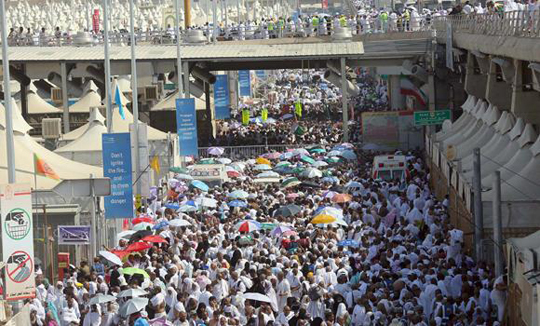
Mina, Oct 7: A total of 650 pilgrims were found sleeping in a rundown private school in Al-Aziziah next to Mina without food, water and transport on Sunday, allegedly victims of a fake Haj firm.
The pilgrims, from various Arab countries, claimed they paid SR1.6 million to the operator in Buraidah, Qassim, to take them on the holy pilgrimage. They allegedly paid between SR2,000 and SR4,000 for transport, two meals a day and accommodation.
Some pilgrims claimed that the company in Qassim operated under other names in the region. They were allegedly transported in 13 buses to Al-Sail, where a company official apparently told them that they would have to wait until the day of Arafat before trying to enter the holy sites. This was because the police would not check Haj permits on that day.
The pilgrims said they were then forced to enter the holy sites in private cars. When they arrived in Mina on Thursday, Dhul Hijjah 8, they found that the company had not provided them transport between the holy sites, and no food. There were elderly people and children with the group. Some were sick and did not have money to buy food.
Some pilgrims claimed they had to hire their own transport to take them to Arafat on Friday. Others said that the company's director provided them with transport after they threatened to report him to the police. They said they were exhausted and hungry.
A few pilgrims said that after they returned to Mina from Arafat they contacted the company director to demand the accommodation he allegedly promised. However, when they went to the place where they were supposed to stay, it was a rundown private school without proper washing facilities and basic security. The school was so small, some had to sleep out in the yard, they claimed.
The pilgrims said a Saudi owned the company. However, when contacted the citizen claimed he was only an intermediary and that expatriates ran and owned the company, which included Egyptian, Sudanese and Pakistanis.
The pilgrims claimed that the Saudi man provided them with air-conditioning units after they threatened to report him to the police.
A worker from the company said these accusations were false, but admitted the company organized pilgrimages without permits.
He refused to answer further questions.







Comments
Add new comment